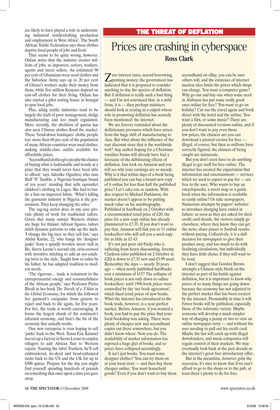Prices are crashing in cyberspace
Ross Clark
Zero interest rates, record borrowing, printing money; the government has indicated that it is prepared to consider anything to slay the spectre of deflation. But if deflation is really such a bad thing — and I’m not convinced that, in a mild form, it is — then perhaps ministers should look at reining in a culprit whose role in promoting deflation has scarcely been mentioned: the internet.
We are forever reminded about the deflationary pressures which have arisen from the huge shift of manufacturing to Asia. But what about the influence of the vast discount store that is the worldwide web? Any author hoping for a Christmas royalties bonus will already have had a foretaste of the debilitating effects of deflation. Just look on Amazon and you will see why your earnings are so measly. Why is it that within days of a book being published you can buy a brand-new copy of it online for less than half the published price? Let’s take one at random. With due respect to Michael Parkinson, the market doesn’t appear to be putting much value on his autobiography. Published in hardback on 2 October with a recommended retail price of £20, the price for a new copy online has already plummeted to £7.35. If you don’t want to pay that, Amazon will link you to 11 online booksellers who will sell you a used copy for as little as £5.43.
It’s not just poor old Parky who is suffering from heavy discounting. Jeremy Clarkson (also published on 2 October at £20) is down to £7.35 new and £5.99 used. Remember the days — nearly 20 years ago — when newly published hardbacks cost a minimum of £15? The collapse of book prices is not only down to online booksellers: until 1996 book prices were controlled by the ‘net book agreement’, which fixed retail prices of new books. What the internet has introduced to the book trade, however, is a near-perfect market. Before Amazon, if you wanted a book, you had to pay the price that your local bookshop was asking. There were plenty of cheaper new and secondhand copies out there somewhere, but you didn’t know where. Now you do. The availability of market information has exposed a huge glut of books, and so prices have collapsed accordingly.
It isn’t just books. You want some designer clothes? You can try them on at your local store — and then buy them cheaper online. You want household goods? Even if you don’t want to buy them secondhand on eBay, you can be sure others will, and the existence of internet auction sites limits the prices which shops can charge. You want a computer game? Why go out and buy one when some nerd in Alabama has put some really good ones online for free? You want to go on holiday? Cut out the travel agent and book direct with the hotel and the airline. You want a film, or some music? There are plenty of discounted versions online, and if you don’t want to pay even those low prices, the chances are you can download a pirated version for free — illegal, of course, but then as millions have correctly figured, the chances of being caught are minuscule.
But you don’t even have to do anything illegal to get stuff for free online. The internet has created the expectation that information and entertainment — services which we used to expect to pay for — are free to the user. Who wants to buy an encyclopaedia, a street map or a guide book when the information is available so easily online? Or take newspapers. Numerous attempts by papers’ websites to introduce charging have ended in failure: as soon as they are asked for their credit card details, the viewers simply go elsewhere, where they know they can get the news, share prices or football results without paying. Collectively, it is a daft decision for newspapers to give their product away, and has much to do with declining circulations, but individually they have little choice if they still want to be read.
I don’t suggest that Gordon Brown attempts a Chinese-style block on the internet as part of his battle against deflation, but it is important to know why prices of so many things are going down: because the economy has not adjusted to the perfect market that has been created by the internet. Presumably in time it will. Fewer books will be published, especially those of the reference variety. Maybe someone will develop a much simpler way of charging a penny or two to view an online newspaper story — and without the user needing to pull out his credit card. Maybe the law will catch up with illegal downloaders, and music companies will regain control of their markets. We may eventually look back at the past decade as the internet’s great free introductory offer.
But in the meantime, however grim the recession, it’s nice to know that if we can’t afford to go to the shops or to the pub, at least there’s plenty to do for free.










































































 Previous page
Previous page